| Srl | Item |
| 1 |
ID:
116207
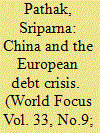

|
|
|
| 2 |
ID:
158374


|
|
|
|
|
| Summary/Abstract |
International cooperation can fail even though governments have no distributional conflicts or incentives to free-ride, face no informational or credibility problems, and even agree on the policies that need to be implemented. Germany's refusal to cooperate with the Eurogroup members on the Greek bailout in 2010 until the crisis threatened to derail the entire Eurozone is puzzling in that regard especially because Germany is the main beneficiary of the euro. It was alleged at the time that this was a dilatory tactic designed to postpone a domestically unpopular decision until after crucial regional elections. But why would voters allow themselves to be misled like that? And why did Merkel agree to the bailout before the elections took place? To analyze how citizen preferences affect international cooperation, we develop a game-theoretic model of the four-way interaction between two governments that must coordinate a response to a crisis affecting both countries but who also must face the polls domestically with an electorate that might be uncertain whether a response is necessary. We find that, paradoxically, governments that stand to receive the greatest benefits from international cooperation face the greatest obstacles to implementing the required policies even when voters would want them to. We show how the model can rationalize Merkel's electoral strategy and why her party suffered at the polls when the strategy went off the rails.
|
|
|
|
|
|
|
|
|
|
|
|
|
|
|
|
| 3 |
ID:
137444
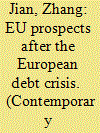

|
|
|
| 4 |
ID:
118196
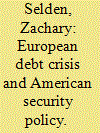

|
|
|
| 5 |
ID:
114772
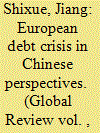

|
|
|
| 6 |
ID:
111557
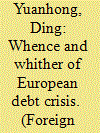

|
|
|
|
|
| Publication |
2011.
|
| Summary/Abstract |
All major developed economies vary in the causes of their debt problems, but the nature is the same: income falling short of expenditure and spending on deficits. The root cause of European debt crisis lies mainly in the "high salary, high welfare" policy universally pursued in the European countries after WWII. The outbreak of global financial crisis became the fuse to the European debt crisis. The economic scales of Greek, Ireland and Portugal troubled by debt problems are not very large. Their debt problems constitute not much risk to the EU. But the European debt crisis has been turned into a hubbub. This is not only because the defects of the EU policy-decision mechanism have provided the public with an opportunity to play up the problem, but also because the US attempts, by speaking ill of the Euro, to resist the pressure from the European side demanding reform of the world financial system dominated by the US dollar. As a matter of fact, the US economic situation is no better than Europe's. Its debt burdens are also heavier than Europe's. Therefore, although European economic recovery will take a considerably long period, the Euro will not "collapse" and the Euro zone will continue to exist. The EU will remain the largest economy in the world.
|
|
|
|
|
|
|
|
|
|
|
|
|
|
|
|